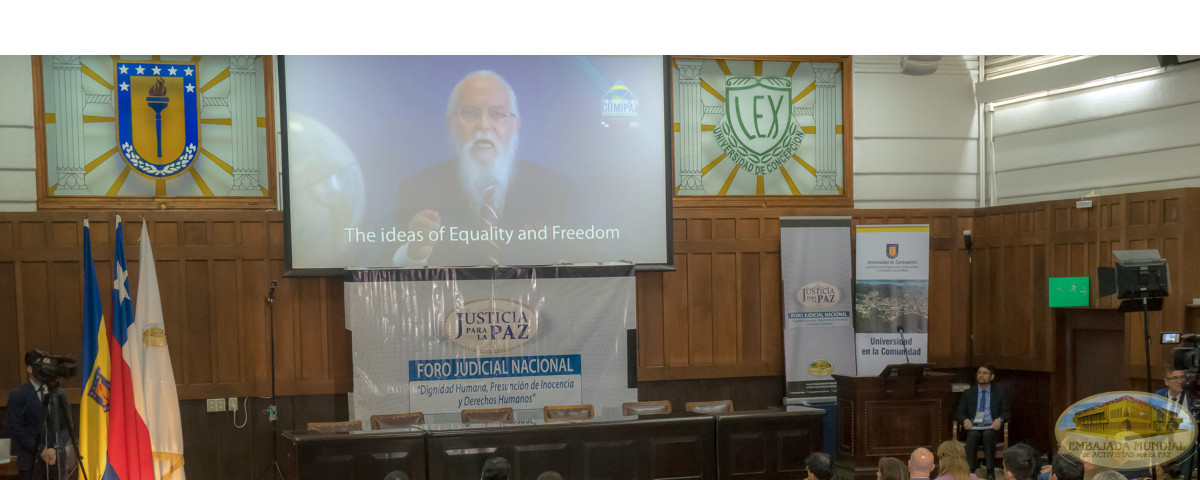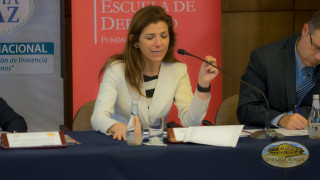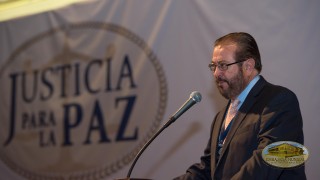The University of Concepción: Promoter of universal justice
Peace and human rights as transversal axes in Chile's education and judicial system
As a great university challenge, the vice-chancellor of the University of Concepción described the generation of a culture of conflicts. This was stated in his speech during the International Judicial Forum "Human Dignity, presumption of innocence and human rights" held in the Auditorium of the Faculty of Legal Sciences of the same university.
He also indicated that, from this perspective, it is necessary to anticipate conflicts by working with children and within families, in order to counteract the ethnic, racial, labor, social and even territorial conflicts that currently exist.
Peace as a foundation of happiness
In the explanatory statement, Gabriela Lara, general director of the GEAP, presented the objectives of the Justice for Peace Program; a program with a legal and social focus that seeks to strengthen universal justice, democracy and respect for human rights, through actions and strategies in the judicial field, in the political field, in the academic field and above all with the purpose to achieve and strengthen world peace.
"There is only one thing on which peace is based: justice; but justice-based and founded on truth, on the defense of rights, on the defense of human dignity and on respect for the rights of victims", indicated Lara.
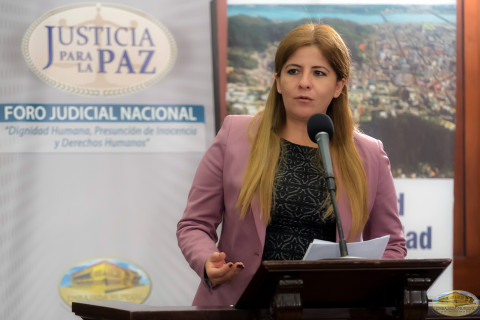
In the same act, the executive president of the GEAP, Dr. William Soto, in a prerecorded video, exposed more extensively the scope and advances of the program that the institution leads at an international level.
Within the framework of the objectives of the program, this forum brought together Dr. Ania Salinas Cerda, assistant magistrate of the International Criminal Court, The Hague; to the Magistrate of the Supreme Court of Justice of Colombia, Dr. Camilo Montoya Reyes; Mr. Jorge Cáceres Méndez, SEREMI of Justice of the Biobío region; Mr. Sergio Camus Campos, SEREMI of Education of the Biobío region; Mr. Juan Alvares Alvares, professor of Law at the University of Concepción (UdeC); Mr. Rafael Figueroa, Sociologist - director of social link VRIM of the University of Concepción (UdeC) who, through dissertations and a panel of questions and answers, addressed current legal and social issues.
International Criminal Cooperation and some proposals for the International Criminal Court
For Montoya Reyes, there is international cooperation to the extent that the States collaborate with the International Criminal Court. He pointed to the International Criminal Cooperation understood as an interaction between two procedural schemes; the procedural schema of the State that requires the aid, and the criminal procedural scheme of the State that provides it, which is the requested State.
He also stressed that the efficiency and effectiveness of the International Criminal Court should look at what kind of collaboration will be provided by those States and on this matter, he referred to the two types of schools: the realistic school and the liberal school and some obligations for international cooperation, including the fact of fully accepting the material competence of the International Criminal Court.
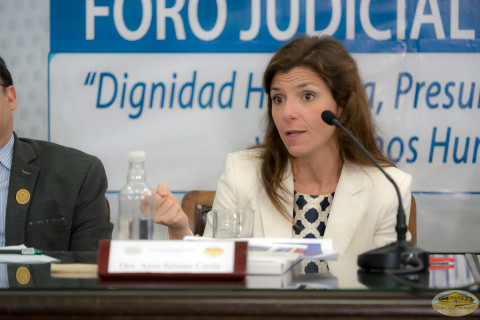
Within the framework of this theme, Dr. Ania Salinas highlighted the challenges facing the International Criminal Court, specifically in the area of complementarity, legitimacy and efficiency and effectiveness of this Court in the International Criminal Justice System.
She pointed out that the ICC has very limited jurisdiction over the trial and investigation of violations of fundamental rights and guarantees since the States continue to have the primacy of these two powers because of the principle of complementarity created by the Rome Statute.
"The promotion of the investigation and prosecution of crimes of competence of the Court at the national level, and not only before the Court, is essential for the effectiveness and success of the international and national global criminal justice system presided over by the Court and is one of the biggest challenges we have to face”, mentioned Salinas.
After presenting the figures of the cases that the International Criminal Court has known and the situations in each of them, she concluded that the ICC has recognized that providing high-quality justice in an expeditious manner is essential to maintain and strengthen the credibility of the Institution and with it the trust and cooperation of the global community.
.
Reflections on human dignity, presumption of innocence and human rights
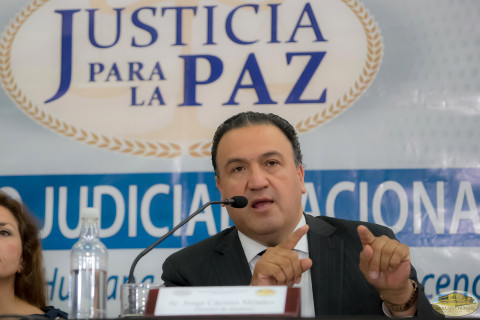
"The human being, an end in itself", this was the conception from which the analysis of the topics proposed in the first discussion panel was made.
Jorge Cáceres, referred to the current state of human rights in Chile in terms of legal structure and ministerial rank for this issue as a result of Law 20,885, in addition to the National Human Rights Plan that is intended to be ready in the first quarter of 2018.
According to Cáceres, the entire regulatory framework and public policies aimed at issues of protection and recognition of human rights are short, if they go hand in hand with an educational program or an educational measure that helps in its dissemination and respect.
For his part, the sociologist Rafael Figueroa emphasized the importance of working in alliances, united under the same objective, reiterating that only from true activism and the return to the true concept of militancy in favor of peace is it possible to reconstruct society.
"We have to address leadership training, training to work beyond our valid differences, but the formation of youth-oriented actors and agents of unity rather than division from people seeking agreements rather than no agreements, which is a fundamental value", he stated.
Sergio Campus emphasized work from childhood, in the urgent need to deliver tools and sufficient strategies that lead to effective work to protect human rights.
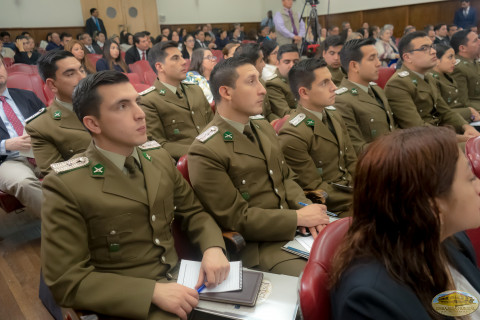
Referring to the children, he said: "That they incorporate, among their intellectual construct: respect, the promotion of rights. Clearly, there is absolute coincidence, in that our children are aware that they belong to a community that develops in the educational space. The space to be able to generate a process respect for the experiences, respect for others that allows transparency, solidarity, as values that not only allow the individual construction of knowledge, but also the collective construction. A much greater construct, the collective formation".
Continuing with the thematic line and in contribution to the forum discussions, Professor Juan Álvarez referred to the existing procedure in prudential matters, when it is a violation of the rights of children and adolescents in the Chilean environment.
According to their participation, in Chile, there has been an important advance in terms of protection measures for minors in their vulnerability condition and this even has repercussion in legislative measures in the legal field to apply speed in the cases where defending the interests of minors who have been violated or attacked has been necessary.
New members of ALIUP
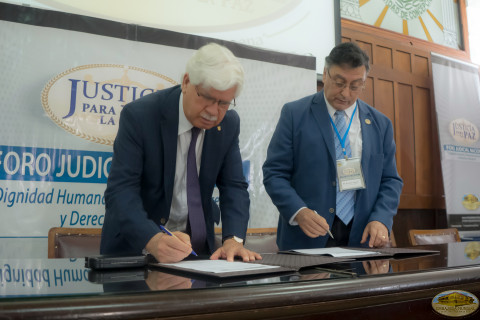
The ALIUP and the University of Concepción now become allies of vital importance to promote and build a culture of peace from university education, in which the future professionals of Chile contribute with ethical and moral values from their roles in the society to the happiness, the well-being, the peace of the human family and of the nations.
